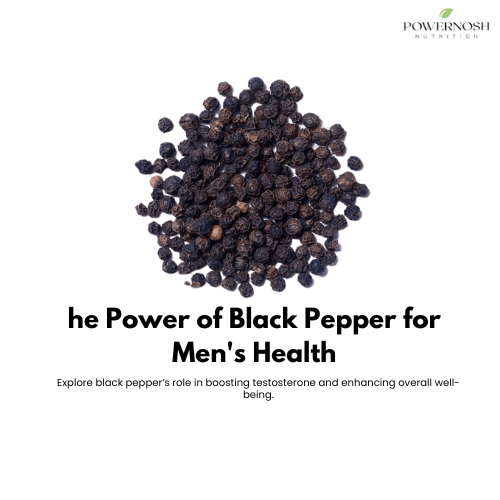
Black Pepper for Men's Health: Boosting Testosterone & Wellness
Share
Black pepper, scientifically known as Piper nigrum, is one of the most commonly used spices worldwide. With its origins traced back to India, black pepper has a rich history dating back thousands of years, where it was highly prized for its intense flavor and medicinal properties. Today, it is a staple in kitchens around the globe, adding depth and complexity to a wide range of dishes. Beyond its culinary uses, black pepper has gained attention for its potential benefits for men's sexual wellness and testosterone levels.
Nutritional Value and Composition
Despite its small size, black pepper packs a powerful nutritional punch. It is low in calories but rich in essential nutrients and bioactive compounds. A one-teaspoon serving of ground black pepper (approximately 2 grams) contains:
-
Calories: 5
-
Carbohydrates: 1.3 grams
-
Fiber: 0.5 grams
-
Protein: 0.2 grams
-
Fat: 0.1 grams
-
Vitamin K: 6 micrograms (7% of the Daily Value)
-
Manganese: 0.4 milligrams (18% of the Daily Value)
Black pepper also contains a potent compound called piperine, which is responsible for its characteristic spicy taste. Piperine is known for its bioavailability-enhancing properties, which can improve the absorption of other nutrients from food and supplements. Additionally, black pepper contains antioxidants, such as flavonoids and carotenoids, which help protect cells from damage caused by harmful free radicals.
Impact on Testosterone Levels
Research suggests that black pepper may have a positive impact on testosterone levels in men. Testosterone is a hormone that plays a crucial role in male sexual development, libido, and reproductive function. Low testosterone levels can lead to a range of symptoms, including reduced libido, erectile dysfunction, and fatigue.
Several studies have investigated the effects of black pepper and its active compound, piperine, on testosterone levels. While the exact mechanisms are not fully understood, researchers believe that piperine may stimulate the production of testosterone or inhibit its breakdown in the body. Additionally, piperine may enhance the bioavailability of other compounds that support testosterone synthesis, such as zinc and magnesium.
By promoting healthy testosterone levels, black pepper may help improve sexual wellness and vitality in men. Regular consumption of black pepper as part of a balanced diet may support overall reproductive health and function.
Other Health Benefits
In addition to its potential effects on testosterone levels, black pepper offers a variety of other health benefits:
-
Antioxidant Properties: Black pepper is rich in antioxidants, which help protect cells from damage caused by oxidative stress. Antioxidants neutralize harmful free radicals in the body, reducing the risk of chronic diseases such as cancer, heart disease, and diabetes.
-
Digestive Health: Piperine, the active compound in black pepper, has been shown to stimulate digestive enzymes and improve digestive function. It may help alleviate symptoms of indigestion, bloating, and gas. Additionally, black pepper may enhance nutrient absorption, ensuring that the body can efficiently utilize the vitamins and minerals present in food.
-
Anti-inflammatory Effects: Piperine has anti-inflammatory properties that may help reduce inflammation in the body. Chronic inflammation is linked to a variety of health conditions, including arthritis, cardiovascular disease, and certain types of cancer. By reducing inflammation, black pepper may help promote overall health and well-being.
Culinary Uses of Black Pepper
Black pepper is a versatile spice that can be used in a wide variety of dishes. It adds depth and complexity to savory dishes, salads, soups, and sauces. Ground black pepper is a popular seasoning for meats, poultry, seafood, and vegetables. It can also be used to flavor marinades, dressings, and dips.
Whole black peppercorns can be crushed or ground using a pepper mill or mortar and pestle to release their aroma and flavor. Freshly ground pepper has a more intense flavor than pre-ground pepper and is preferred by many chefs for its superior taste.
When cooking with black pepper, it's important to use it judiciously, as its pungent flavor can easily overpower other ingredients. Start with a small amount and adjust to taste as needed. Black pepper pairs well with a wide range of herbs and spices, including garlic, thyme, rosemary, and basil.
Safety and Considerations
While black pepper is generally safe for most people when consumed in moderate amounts as a food seasoning, there are some considerations to keep in mind:
- Potential Side Effects: Consuming large amounts of black pepper or piperine supplements may cause gastrointestinal discomfort, such as heartburn, indigestion, or diarrhea, in some individuals. It is best to use black pepper in culinary amounts and avoid excessive consumption.
- Interactions with Medications: Piperine may interact with certain medications and affect their absorption and metabolism in the body. If you are taking prescription medications, especially those with a narrow therapeutic index, consult with your healthcare provider before using black pepper or piperine supplements.
-
Allergic Reactions: While rare, allergic reactions to black pepper have been reported in some individuals. If you experience symptoms such as itching, swelling, or difficulty breathing after consuming black pepper, seek medical attention immediately.
Conclusion
In conclusion, black pepper is more than just a common spice—it may also offer benefits for men's sexual wellness and testosterone levels. With its rich nutritional profile, antioxidant properties, and potential health benefits, black pepper is a valuable addition to a healthy diet. By incorporating black pepper into your meals and recipes, you can enhance the flavor of your dishes while supporting your overall health and well-being. As with any dietary supplement, it's essential to use black pepper in moderation and consult with your healthcare provider if you have any concerns or underlying health conditions.

